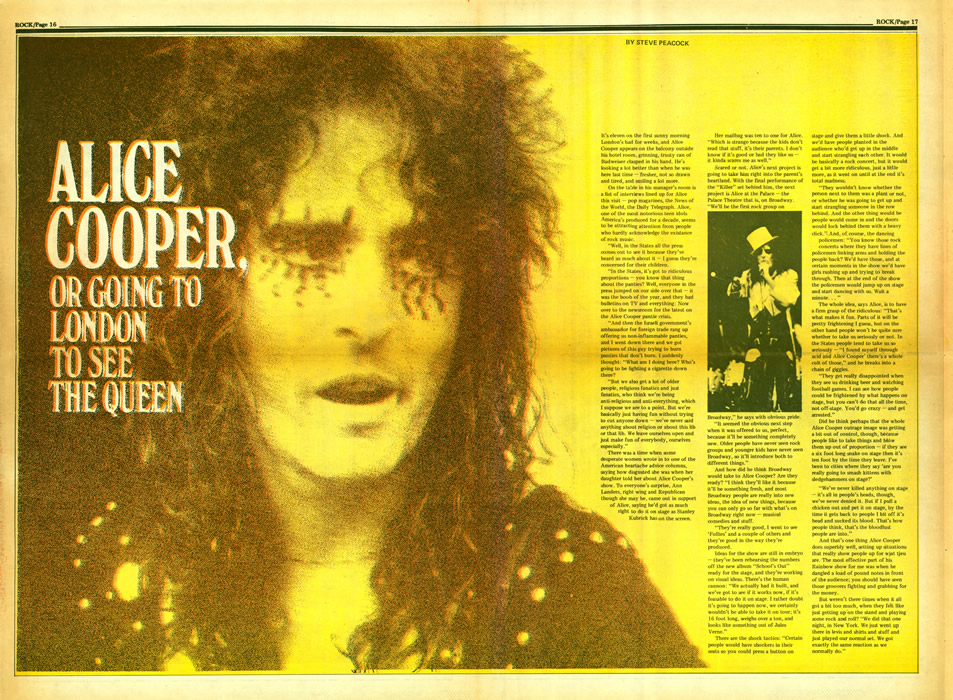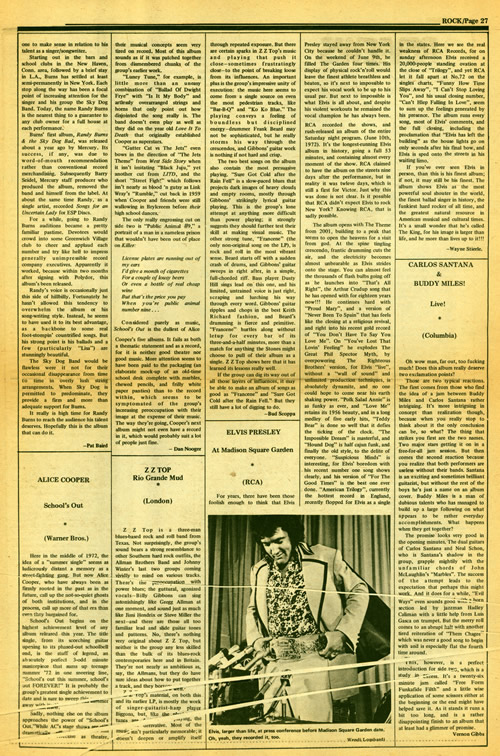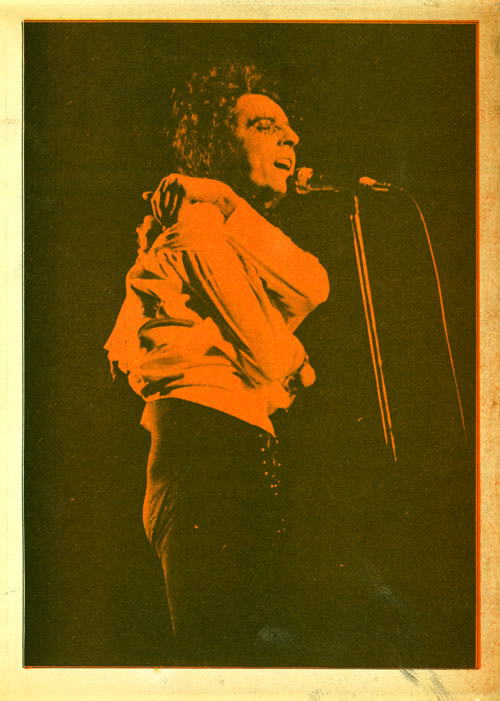Article Database
Alice Cooper, or Going To London To See The Queen
It's eleven on the first sunny morning London's had for weeks, and Alice Cooper appears on the balcony outside his hotel room, grinning, trusty can of Budweiser clasped in his hand. He's looking a lot better than when we was here last time - fresher, not so drawn and tired, and smiling a lot more.
On the table in his manager's room is a list of interviews lined up for Alice this visit - pop magazines, the News of the World, the Daily Telegraph. Alice, one of the most notorious teen idols America's produced for a decade, seems to be attracting attention from people who hardly acknowledge the existance of rock music.
"Well, in the States all the press comes out to see it because they've heard so much about it - I guess they're concerned for their children.
"In the States, it's got to ridiculous proportions - you know that thing about the panties? Well, everyone in the press jumped on our side over that - it was the boob of the year, and they had bulletins on TV and everything: Now over to the newsroom for the latest on the Alice Cooper panties crisis.
"And then the Israeli government's ambassador for foreign trade rang up offering us non-inflammable panties, and I went down there and we got pictures of this guy trying to burn panties that don't burn. I suddenly thought: "What am I doing here? Who's going to be lighting a cigarette down there?"
"But we also get a lot of older people, religious fanatics and just fanatics, who think we're being anti-religious and anti-everything, which I suppose we are to a point. But we're basically just having fun without trying to cut anyone down - we've never said anything about religion or about this lib or that lib. We leave ourselves open and just make fun of everybody, ourselves especially."
There was a time when some desperate women wrote in to one of the American heartache advice columns, saying how disgusted she was when her daughter told her about Alice Cooper's show. To everyone's surprise, Ann Landers, right wing and Republican though she may be, came ou in support of Alice, saying he'd got as much right to do it onstage as Stanley Kubrick has on screen.
Her mailbag was ten to one for Alice. "Which is strange because the kids don't read that stuff, it's their parents. I don't know if it's good or bad they like us - it kinda scares me as well."
Scared or not. Alice's next project is going to take him right into the parent's heartland. With the final performance of the "Killer" set behind him, the next project is Alice at the Palace - the Palace Theatre that is, on Broadway. "We'll be the first rock group on Broadway," he says with obvious pride.
"It seemed the obvious next step when it was offered to us, perfect, because it'll be something completely new. Older people have never seen rock groups and younger kids have never seen Broadway, so it'll introduce both to different things."
And how did he thing Broadway would take to Alice COoper? Are they ready? "I think they'll like it because it'll be something fresh, and most Broadway people are really into new ideas, the idea of new things, because you can only go so far with what's on Broadway right now - musical comedies and stuff.
"They're really good, I went to see 'Follies' and a couple of others and they're good in the way they're produced."
Ideas for the show are still in embryo - they've been rehearsing the numbers off the new album "School's Out" ready for the stage, and they're working on visual ideas. There's the human cannon: "We actually had it built, and we've got to see if it works now, if it's feasable to do it on stage. I rather doubt it's going to happen now, we certainly wouldn't be able to take it on tour; it's 16 foot long, weighs over a ton, and looks like something out of Jules Verne."
There are shock tactics: "Certain people would have shockers in their seats so you could press a button on stage and give them a little shock. And we'd have people planted in the audience who'd get up in the middle and start strangling each other. It would be basically a rock concert, but it would get a bit more ridiculous, just a little more, as it went on until at the end it's total madness.
"They wouldn't know whether the person next to them was a plant or not, or whether he was going to get up and start strangling someone in the row behind. And the other thing would be people would come in and the doors lock behind thme with a heavy click."
And, of course, the dancing policemen: "You know those rock concerts where they have lines of policemen linking arms and holding people back? We'd have those, and at certain moments in the show we'd have girls rushing up and trying to break through. Then at the end of the show the policement would jump up on stage and start dancing with us. Wait a minute..."
The whole idea, says Alice, is to have a firm grasp of the ridiculous: "That's what makes it fun. Parts of it will be pretty frightening I guess, but on the other hand people won't be quite sure whether to take us seriously or not. In the States people tend to take us so seriously - 'I found myself through acid and Alice Cooper' there's a whole cult of those," and he breaks into a chain of giggles.
"They get really disappointed when they see us drinking beer and watching football games. I can see how people could be frightened by what happens on stage, but you can't do that all the time, not off-stage. You'd go crazy - and get arrested."
Did he think perhaps that the whole Alice Cooper outrage image was getting a bit out of control, though, because people like to take things and blow them up out of proportion - if they see a six foot long snake on stage then it's ten foot by the time they leave. I've been to cities where they say 'are you really going to smash kittens with sledgehammers on stage?'
"We've never killed anything on stage - it's all in people's heads, though, we've never denied it. But if I pull a chicked out and pet it on stage, by the time it gets back to people I bit off it's head and sucked its blood. That's how people think, that's the bloodlust people are into."
And that's one thing Alice Cooper does superbly well, setting up situations that really show people up for what they are. The most effective part of this Rainbow show for me was when he dangles a load of pound notes in front of the audience; you should have seen those groovers fighting and grabbing for then money.
But weren't there times when it all got a bit too much, when they felt like just getting up on the stand and playing some rock and roll? "We did that one night, in New York. We just went up there in levis and shirt and stuff and just played our normal set. We got exactly the same reaction as we normally do."
ALICE COOPER - School's Out (Warner Bros.)
Here in the middle of 1972, the idea of a "summer single" seems a ludicrously distant a memory as a street-fighting gang. But now Alice Cooper, who have always been as firmly rooted in the past as in the future, call up the not-so-quiet ghosts of both institutions, and in the process, call up more of that era than even they bargained for.
School's Out begins on the highest achievement level of any album released this year. The title single, from its scorching guitar opening to it's phased-out schoolbell end is the stuff of legend, an absolutely perfect 3-odd minute masterpiece that sums up teenage summer '72 in one sneering line, "School's Out this summer, school's out FOREVER!" It is probably the group's greatest single achievement to date and is sure to sweep this summer away with itself.
Sadly, nothing else on the album approaches the power of "School's Out." While AC's stage shows are still dramatically effective as theatre, their musical concepts seem very tired on record. Most of this alum sound as if it was patched together from dismemebered chunks of the group's earlier work.
"Luney Tune," for example, is little more than an uneasy combination of "Ballad of Dwight Fry" with "Is It My Body" and artlessly arranged strings and horns that only point out how disjointed the song really is. The band doesn't even play as well as they did on the year old Love It To Death that originally established Cooper as superstars.
"Gutter Cats vs The Jets" even bows in the direction of "The Jets Theme" from West Side Story when it isn't imitating "Black Juju," yet another cut from LITD, and the short "Street Fight" which follows isn't nearly as blood 'n gutsy as Link Wray's "Rumble," cut back in 1959 when Cooper and friends were still wallowing in Brylcreem before their high school dances.
The only really engrossing cut on side two is "Public Animal #9," a portrait of a man in a nameless prison that wouldn't have been out of place on Killer:
License plates are running out of my ears
I'd give a month of cigarettes
For a couple of lousy beers
Or even a bottle of real cheap wine
But that's the price you pay
When you're public animal number nine...
Consider purely as music, School's Out is the dullest of Alice Cooper's five albums. It fails as both a thematic statement and as a record, for it is neither good theatre nor good music. More attention seems to have been paid to the packaging (an elaborate mock-up of an old-time school desk complete with marbles, chewed pencils, and frilly white paper panties) then to the record within, which seems to be symptomated of the group's increasing preoccupation with their image at the expense of their music. The way they're going, Cooper's next album might not even have a record in it, which would probably suit a lot of people just fine.







